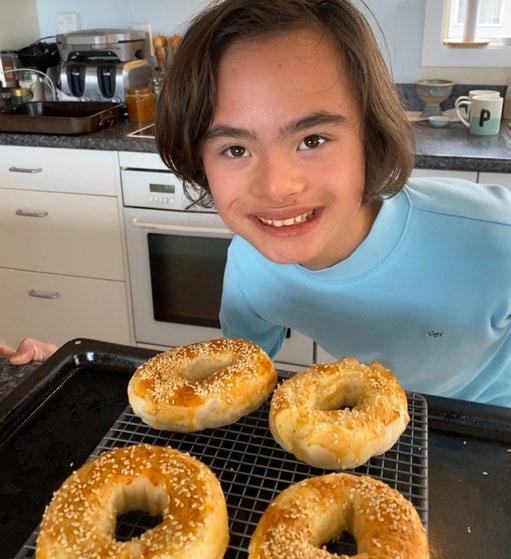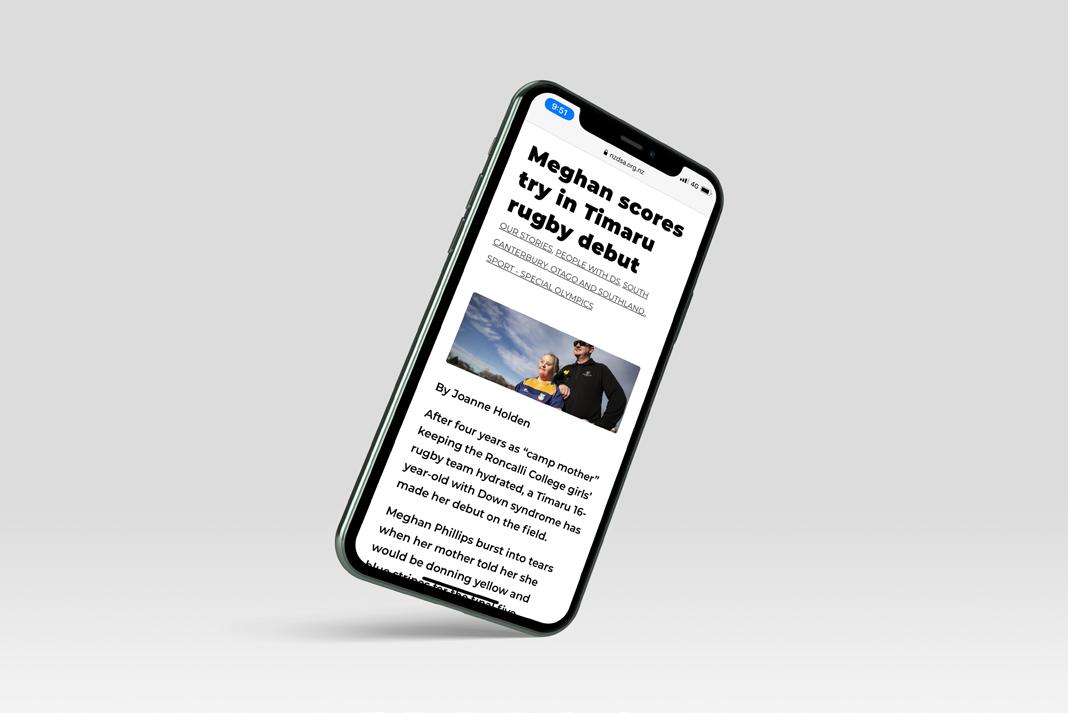
7 minute read
HONOURING OUR VOLUNTEERS
By Zandra Vaccarino
Kia ora COVID-19 has dominated the news and impacted on everyone and has meant changes in all aspects of our lives. We certainly have all developed resilience during this time! I think we have all found ways of adapting and navigating challenges in our personal and work lives. Despite the challenging times of lockdown, it seems that many people have exited Levels 4, 3 and now 2 having gained some worthwhile perspectives and I think some of us will try to hold onto new habits that we established, or continue to enjoy new rhythms we have developed. However, I am aware that for some families and whānau, including ours, it has meant a greater demand on personal resources as we stepped into the gap to meet the needs of our whānau as natural supports, paid supports and service providers were no longer able to provide the usual support or activities during lockdown. I am also aware that some families and whānau chose not to have support people included in their bubble because of higher risk potential. Whilst we had anecdotal information of how our community was coping in lockdown, the NZDSA thought it would be valuable to circulate a survey so that our advocacy efforts would accurately reflect the experiences of our community during lockdown. Thank you to everyone who participated. Our editor has included the survey results in this edition of CHAT 21 which makes for interesting reading. I think the key factor highlighted in this survey, which isn’t surprising, is that family and whānau are the ones who continue to provide support in crisis and that whilst service providers or support people can opt not to provide support, this is not an option for families and whānau who are expected to step up and provide all the care and supports that are needed. One positive outcome of lockdown was that the Ministry of Health recognised the need for more flexible use of funding and the usual constraining criteria were removed which lead to families and whānau demonstrating creative ways to address needs while upholding the principles of enabling good lives. I have heard parents say that if greater flexibility of funding was allowed during lockdown, then it should continue after lockdown and that the momentum cannot be lost. Therefore, the NZDSA will continue to advocate at a national level for disabled people and their family and whānau for this to continue and for more choice and control on how they use disability funding. You might be wondering what impact COVID-19 had on the NZDSA. We are fortunate that the NZDSA continued to operate throughout the lockdown levels and restrictions. Our mailboxes were flooded with COVID-19 information that was overwhelming at times! Whilst all the information was informative, not everything was pertinent to our community, so the NZDSA team decided to filter relevant and key information and share this with our community via our newly launched website. We also shared information via Enews and other social media platforms. Unfortunately, we do not have email addresses for all our members, so we are aware that some people may not have received information. So, please go to the NZDSA website and see that your information is current. As we moved to Level 2, the NZDSA recognised that some parents had concerns about returning
to school so we contacted the Ministry of Education to ask if they would host a webinar to address questions. The Ministry agreed and opened the session to the wider learning support community. I joined the session and noted that almost 500 people attended. I have enjoyed the opportunity to link into a range of national and international zoom meetings or webinars addressing a number of topics, which have also included opportunities to advocate for issues that our community is facing. The NZDSA had a number of workshops scheduled during lockdown which we moved online where possible, and we have rescheduled other workshops. We also hosted zoom meetings for self-advocates and parents who had workshops scheduled; and we have had regular meetings with our STRIVE members, as well as NZDSA committee meetings. I would urge you to keep looking online to check what workshops have moved as there are opportunities to engage in national and international training that would not usually be accessible.
National Volunteer Week - 21 June to 27 June
The National Volunteer Week is an opportunity to acknowledge and celebrate the collective contribution of all our volunteers who enrich the Down syndrome community in Aotearoa New Zealand! This year’s theme was ‘Te Hua o te Mahi Tahi - The benefit of working together’. I think if we reflect over the past 39 years since the NZDSA was established, we could list significant benefits of working together to support families and whānau and people with Down syndrome, to create greater awareness of Down syndrome, and to lobby for policy change. Working together is the only way to continue to bring change for people with Down syndrome. During the COVID-19 response, we saw the power and potential of volunteering. Mahi Aroha and social action shine through at times when our community and the wider communities were stretched and challenged. Working together as we come out of COVID-19 will make our community stronger, and more than ever, our volunteers will continue to play an integral role in strengthening and developing the Down syndrome community. Thank you all our volunteers - parents, siblings, whānau, young people with Down syndrome and supporters! You are valued and your contributions will help to shape the world we want to live in, now and into the future!
NZDSA’s Annual Appeal - May to July 2019
The NZDSA’s annual fundraising telephone campaign took place earlier this year due to COVID-19 but we appreciate that Southern Stars, a Charitable Trust, was still able to run the campaign on behalf of the NZDSA despite the challenge of working differently during lockdown. This year the campaign kicked off on the 25th May and runs through to the 3rd July. The campaign will support the Youth Development camp and all the related costs of publishing CHAT 21. If you receive a call from a Southern Stars team member, take a moment to thank them for supporting our community and if you do make a donation, thank you! The funding that the NZDSA has received from
Vinne, Rachel and Zandra

generous donors over a number of years, has enabled the NZDSA to host camps and workshops for people with Down syndrome as well as enabling the NZDSA to produce resources like our New Parent Pack, Plan for the Future, Turn the Page, Transition from School, Creating a Positive Hospital Experience, Play and Daily Routine, Dear Community, Dear Health Professionals and the more recent #We Decide digital story.
Rose Awards
We haven’t received a nomination for a Rose Award for a number of editions. So, I would like to encourage you to nominate a deserving individual or organisation for the next edition of CHAT 21. The Rose Awards provide the opportunity to thank individuals or organisations who either support individuals with Down syndrome or the Down syndrome community. Please email nzdsi@extra.co.nz your nominations for an individual, family, or organisation explaining what they have done to “promote the participation of people with Down syndrome in their community”. We will acknowledge the person in CHAT 21 and will post them a letter outlining why they were selected and include a box of Rose’s chocolates.
General Elections – 19th September
If you have received CHAT 21 for a few years you will know that I will always urge everyone to vote. Why? My response would be: for our children! Your voice and vote can make a difference. Your vote has the power to determine which political party will govern New Zealand and drive policies. So it is important to consider which political party you believe will implement policies that will facilitate people with Down syndrome to enjoy full citizenship rights. It may require a little research to identify each parties’ policy on key issues for the disability sector, but we hope to share information via our social media platforms, so please sign-up for the NZDSA Enews (please email hello@nzdsa.org. nz) so that you can be added to the distribution list, or become a friend on the NZDSA Facebook page. In New Zealand people with Down syndrome enjoy the right to vote. The Electoral Commission usually provides resources to assist people with Down syndrome to participate in the election. To find out more you can visit www.elections.org.nz
Hei konei rā Zandra










